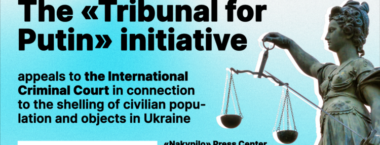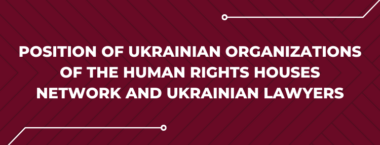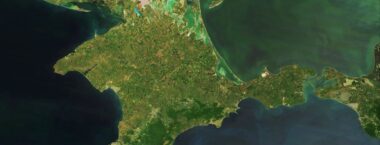26.03.2018, Kyiv
[email protected]
The annexation of Crimea by the Russian Federation with the use of its own armed forces in March 2014 caused numerous violations of rights and freedoms, including freedom of thought and expression, conscience and religion. Forced introduction of Russian legislation has considerably worsened the situation of religious groups. Mandatory state registration of religious communities and religious objects, control over the issue and distribution of religious literature, etc. were established. These demands led to unjustified restrictions on freedom of religion. It is not surprising that as of September 2017, the number of religious communities fell by 63% compared with the beginning of 2014.
The rigid and repressive anti-terrorist and anti-extremist Russian legislation created wide opportunities for persecuting religious communities and individual believers. The Federal List of Extremist Materials, formed without proper legal justification, contains a large number of religious books, although these publications have no restrictions according to the legislation of Ukraine. Under the pretext of the search for extremist materials, representatives of the Russian law enforcement agencies constantly searches for libraries, prayer houses, schools of Muslims (madrassas, mosques), as well as lawyers, journalists and civil activists.
This is a widespread practice of mass raids to verify the documents of believers during Friday Namaz Time. They are conducted with significant violations: the mosque is blocked, documents are all checked, people are taken for questioning, forcing fingerprints and gathering materials for DNA analysis.
The Russian legislation defines the concept of “missionary activity” and administrative responsibility for its carrying out outside established venues. These provisions are actively applied in the Crimea. In February 2017, the Seventh-day Adventist Church was fined because of the lack of a signboard on the building where worship is held. The signboard itself was temporarily placed in the lobby of the church through the repair of the façade. There are cases of persecution for “reading the Bible and prayer”, “distributing leaflets with an invitation to the house of prayer”, “religious songs” and other actions that the occupation courts equal to the missionary activity.
It should be noted that these restrictions are not applied in practice to the Orthodox Church of the Moscow Patriarchate. Those religious organizations that demonstrate a high level of loyalty to the Russian authorities are also in the privileged position. It thus clearly follows the discriminatory attitude of the Russian authorities towards different religious denominations.
The number of criminal cases initiated for membership in religious organizations or associations that were recognized in the Russian Federation as terrorist or extremist, although they freely pursue their activities in Ukraine.
As of January 2018, 25 Muslims were deprived of their liberty for belonging to Hizb ut-Tahrir. Among them is a human rights activist Emir-Usein Kuku, recognized as a prisoner of conscience by Amnesty International. In these cases there is no evidence of preparation or conduct of terrorist acts. Litigation takes place with numerous violations. Last year, Jehovah’s Witnesses were attributed to the list of banned religious organizations in Russia. According to the Jehovah’s Witnesses in Russia website, their number in the Crimea is about 8,000.
The grounds for administrative or criminal prosecution may even be publications in social media. In January 2017, lawyer Emil Kurbedinov was arrested, who provided aid to those persecuted for political reasons. He was assigned 10 days of arrest for the post with the symbolism of Hizb ut-Tahrir, which he published in 2013 long before the Crimean annexation. On March 22, 2018, a citizen journalist Nariman Memediminov was arrested. The reason for the prosecution was a video in the social media with anger at the persecution of Muslims in the Russian Federation.
Churches that are associated with Ukraine are in a critical situation in the occupied Peninsula. One of the methods of pressure is the deprivation of ownership of religious buildings due to physical capture or the decision of the occupation courts. So, before the annexation, the Ukrainian Orthodox Church of the Kyiv Patriarchate had approximately 50 religious organizations in the Crimea. As of January 2018 their number decreased to 9.
We are compelled to state that the Russian authorities in Crimea do not recognize the freedom of religion, but consider it as a collective category that is connected with the state registration or belonging to religious organizations, which show a high level of loyalty to the Russian authorities.
Even worse is the observance of the freedom of thought and expression, conscience and religion in the Russian-occupied part of the Donetsk and Luhansk oblasts in Eastern Ukraine. Since the beginning of the armed conflict, illegal armed formations created by the direct participation of the Russian Federation proclaimed the Orthodox Church of Moscow Patriarchate the main religion of the region. In May 2014, the so-called “Constitution of the Donetsk People’s Republic” was promulgated, proclaiming that “the primordial and dominant faith is the Orthodox faith […], which is confessed by the Russian Orthodox Church (Moscow Patriarchate)”.
In order to implement this provision, illegal armed formations began persecution of confessions different from the Orthodox Church of the Moscow Patriarchate. Dozens of temples, prayer houses and places of worship were captured and are now under the control of armed formations. Abduction, torture and extrajudicial executions of clerics and believers of the Ukrainian Orthodox Church of the Kyiv Patriarchate, the Ukrainian Greek Catholic Church, and a number of Protestant Churches began on the territories uncontrolled by the Ukrainian government in the Donetsk and Luhansk oblasts.
For example, in August 2014, representatives of illegal armed groups detained a Protestant pastor Oleksandr Khomchenko after a prayer on the square in the city of Donetsk. He was accused of organizing unauthorized gatherings, supporting the Ukrainian Army and involving people into a cult. The kidnappers made it clear that “there should be only one religion on this land”. The pastor spent four days in prison and suffered severe bodily injuries after brutal beatings and strangulation.
Here is how he tells of this experience: “They hung me up for a hook and put a gas mask on me. They clenched a hole at the end of the tube, blocking the air stream so I could not breathe. When I was unconscious they opened the hole and covered it with a cloth soaked in ethanol. I did a deep breath, because I was on the brink of loss of consciousness, and I felt a fire in my chest. I coughed and gasped from lack of fresh air, and then they began to beat me again with batons on my chest and back, which was repeated over and over again”.
Unfortunately, torture greatly undermined the health of pastor Oleksandr Khomchenko, and in February 2018 he died.
The magnitude and intensity of persecution on religious grounds, which was recorded by human rights defenders, indicates that crimes against humanity are occurring in the occupied territories of Donetsk and Luhansk oblasts in accordance with the definition of international humanitarian law. As a result of this conscious policy, most clergy, together with their families, left the region. Those who are left are forced to undergo worship underground.
A new challenge for freedom of religion was the demand of illegal armed groups for the mandatory re-registration of religious organizations. Failure to comply with this requirement entails criminal liability. A total ban on the activities of religious groups was also introduced, which includes all communities of believers not belonging to the circle of “traditional faiths”, the list of which is indeterminate.
It is necessary to state that in the occupied territories of Donetsk and Luhansk oblasts, most religious communities have ceased to exist, and freedom of thought and expression, conscience and religion is absent as a phenomenon.
In view of the above, human rights organizations in Ukraine ask you to initiate a public report on the state of freedom of thought and expression, conscience and religion in the occupied Crimea and in certain territories of the Donetsk and Luhansk oblasts under the control of the Russian Federation in order to submit it to a specially organized United States congressional hearing.
The human rights organizations of Ukraine are ready to provide all necessary support for the preparation of such a report.
Center for Civil Liberties
Institute for Religious Freedom
Ukrainian Helsinki Human Rights Union
“Hushai“ Association of Christian Lawyers NGO
Open Dialog Foundation
Christian Rescue Service NGO
Luhansk oblast Human Rights Centre “Alternative”
Human Rights Information Center
City Assistance Center NGO
Kharkiv Human Rights Protection Group
Center of religious science research and international spiritual relations
Association of the Relatives of the Kremlin’s Political Prisoners
Crimean Human Rights Group
Association of Christian Lawyers of Ukraine NGO



